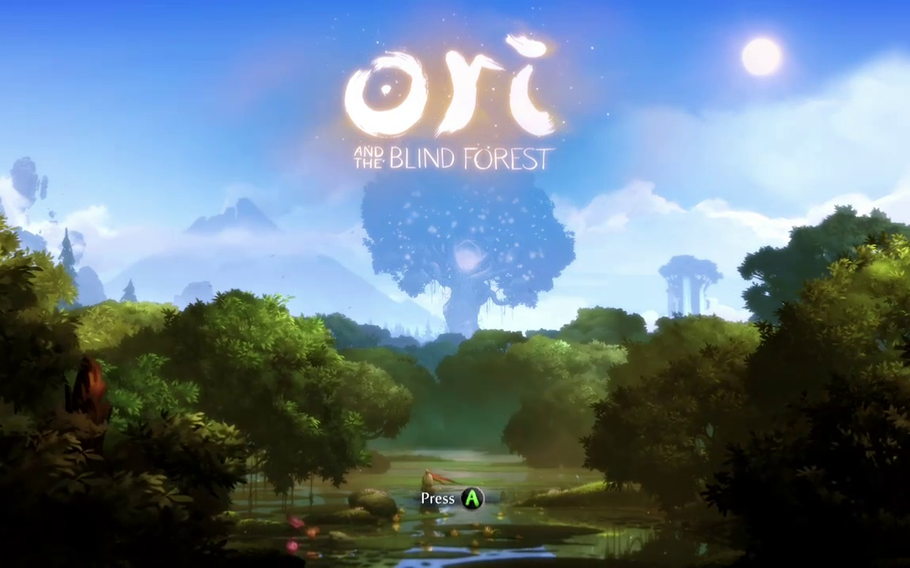
“Ori and the Blind Forest” is a superb experience. Don’t let the quasi-indie, artsy veneer fool you into thinking this is an easy or shallow experience. ()
The indie platformer is one of the more overrepresented genres in gaming today. And when your indie platformer is of the artsy, “Metroidvania” flavor, you're in danger of completely blending in with the crowd.
As hard as it is to resist the urge to pass over any game with “platformer” “artistic” or “indie” in its description, “Ori and the Blind Forest,” deserves a closer look.
As you control the titular character — a luminescent bundle of hopping adorableness — you will dodge traps, solve puzzles and fight enemies with an ever-expanding arsenal. As with the “Metroid” and “Castlevania” games that the genre has taken its name from, you will also explore a massive world with segments that remain unreachable until you’ve unlocked the right ability.
On paper, “Ori,” created by Moon Studios in conjunction with Microsoft Studios, seems exactly like the hundreds of similar titles clogging the digital shelves. But its execution shows what the genre can produce when a little bit of love is added to the old formula.
The first, and most immediate, attraction of “Ori” is its absolutely stunning visuals. Screenshots really don’t do the game justice. Sure, they show off the excellent use of coloring and shadowing that create an immersive depth to the otherwise 2-D world. Screenshots can even capture the varied and colorful enemies and even hint at the expansive area of “Ori’s” forest.
But the real beauty of “Ori” is communicated with the silky smooth animation reminiscent of Studio Ghibli films like “Spirited Away.” It very much looks and feels like a controllable cartoon. It’s not only the best animated game of the year, it may very well be the best animation in video gaming, period.
“Ori” is more than just a pretty face though. The game has some real depth behind it and it also happens to be one of the more challenging experiences on the market this year.
The underlying mechanic of platformers in this style is unlockable abilities that allow access to further areas of the map. “Ori” has this mechanic, but adds to it by expanding each ability beyond its primary function.
A great example is the boost-jump ability that allows Ori to leap higher. In most platformers, that would be the end of the use of that ability. In “Ori” that same ability is also used as a parry mechanic that allows you to redirect enemy projectiles. Most of the abilities have secondary and even tertiary uses.
Defeated enemies drop experience orbs that can be cashed in to upgrade these abilities further. While the upgrade paths are linear in nature, they still allow for some small amount of player customization.
This becomes an important part of the game, because players will need every bit of help they can get. Despite its childlike visuals and charming piano-backed soundtrack, “Ori” is not an easy-going game. It’s actually one of the most difficult games I have played this year.
The beginning of the game starts innocuous enough. A short, emotional gut punch of an introduction sets up the story and soon Ori is tossed out into the world. From that point on, the story is largely told through narration that occurs while you play.
There are a smattering of cutscenes at important junctures, but the time you will spend with your hands on the controller is limited more by the need to give your thumbs a rest and less by the game interrupting you with unwanted story elements.
And you will need to give your blistered thumbs a rest. After the introduction, players soon find themselves managing tricky platforming requiring the use of multiple abilities, all while fending off enemies attacking from literally every angle. Enemies cling to every surface and drop down unexpectedly. Some of the platforming takes several tries to get exactly right.
Death is a frequent occurrence, though it rarely feels cheap or undeserved. There are a couple of escape sequences that rely a bit too much on memorization, but other than those few areas, “Ori” rewards the skilled and diligent player. Luckily for the rest of us, save points can be created anywhere (assuming you have collected the right resource) and respawning is instantaneous. That helps take away the pain of dying so often.
The game is also fairly lengthy, clocking in at between 8 and 12 hours. Some of that length is padded out by the constant backtracking through enemy-infested areas, but the flow of the game kept me engaged from start to finish. It never really felt like a slog.
In fact, “Ori” is one of the few games of this type that I wished had gone on longer. When I finally put down the controller, I was left with a distinct sense of disappointment that there wasn’t more.
If it wasn’t for a technical issue that kept the game from launching until I exited and restarted it, the game would be about as close to perfect as possible. It seems that glitch has been patched, but it’s worth noting in case somebody else runs into it.
Despite that one issue, “Ori” is a superb experience. Don’t let the quasi-indie, artsy veneer fool you into thinking this is an easy or shallow experience. Even if you haven’t enjoyed a platformer in years, I would highly recommend giving “Ori and the Blind Forest” a try. It’s easily the early frontrunner for game of the year and shouldn’t be overlooked.
Bottom line: “Ori and the Blind Forest” is a nearly flawless platformer with an unmatched visual aesthetic.
darnell.michael@stripes.com Platforms: Xbox One (reviewed) and PC Online: oriblindforest.com Rated: E